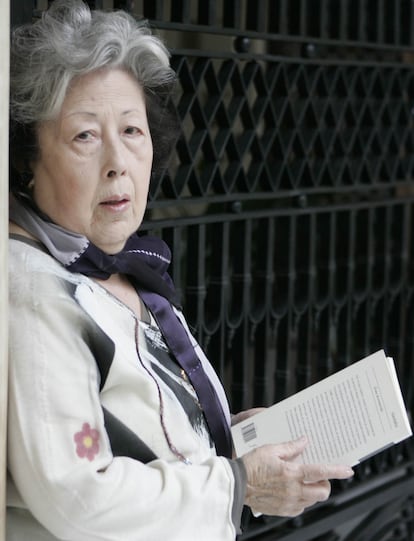Julia Uceda returned to Seville after a very long exile in the early years of the 21st century to become the first woman to receive the National Poetry Prize in a democracy. It was in 2003, a year after the publication of the anthology with a beautiful title In the wind, towards the sea (Fundación José Manuel Lara, 2002), for which she received the award and which her former student, the Sevillian poet Jacobo Cortines, had chosen as one of the founding collections of poems for the Vandalia collection of poetry that she directs with such care and excellence from the Andalusian capital. We then learned in Seville of this free and captivatingly singular poet, strangely removed from the official list of great local and national poets. An author assigned by generation to the social poetry of the 50s, but which she looked at from a distance, from the banks along which the current “and the fashions” flow, as she herself recognized.
Decades had passed in which Julia Uceda had been a poet as interesting as she was ignored in Spain and absolutely unknown in her hometown. However, after being awarded the National Prize, she has been able to receive in her last 20 years of life the unanimous recognition of her work, reflected in the awards that have been coming to her in cascade after the impact of In the wind, towards the sea: Critics’ Prize in 2007, Gold Medal for Fine Arts and the Federico García Lorca International Prize in 2019, among the most notable. In addition, she has been a Favorite Daughter of Andalusia and Honorary Academician of the Royal Seville Academy of Fine Letters. Also in these two decades, the titles published (Unknown Zone, Talking to a beech tree…), media interviews and critical support, contact with readers… Julia Uceda dies at the age of 98 with poetic justice served in her lifetime, but marked by her inherent silence and discretion: a Sevillian poet as atypical – and therefore as Sevillian – as Luis Cernuda, whom she took such care to study, with an incorruptible independence and far removed from literary circles, but appreciated and made visible as an irreplaceable voice in contemporary Spanish poetry.
This is how her editor at the José Manuel Lara Foundation, Ignacio F. Garmendia, described her on Sunday upon learning of her death: “Although she emerged from the fertile humus of the mid-century generation, and was initially linked to the existential tones of those years, her most characteristic poetry was, on the other hand, and in my opinion, not similar to that of her Andalusian contemporaries or to that of the rest of the Spaniards of the fifties. Her uniqueness is absolute and came in part from her familiarity with other cultures and traditions, added to a very personal outlook that was not nourished only by poetry.”
Garmendia refers to the intense life journey of Julia Uceda, married without children to the Andalusian psychiatrist Rafael Gómez Palacios, with whom she embarked on a path to freedom after her decision to leave Seville in the mid-1960s and settle, first, in the United States, where she taught at Michigan State University (between 1965 and 1973), and Ireland from 1974, as a professor at Dublin College. Julia Uceda is not spoken of as an exile of Francoism; but the truth is that the author of Cherry Lane Poems (which she wrote during her years in Michigan) did not return to Spain until the dictator’s death in 1976, to settle in El Ferrol, a land more similar to the Ireland she had just left behind than to the Seville that suffocated her in her youth.
“One day I bought For whom the Bell Tolls (the famous novel by Ernest Hemingway) in a back room in Seville as if it were a drug. This was unbearable,” admitted this intellectual in an interview with EL PAÍS in 2004. She left Spain voluntarily, but was pushed by a moth-eaten atmosphere that made her disagree with everything and everyone.
The blue days of Seville would be left behind when Uceda decided to embark on his own path in poetry. It was in the Andalusian capital where he graduated in Philosophy and Letters, where he later taught classes and where he wrote his first book, Ash butterfly (1959), which would be published in the magazine Alcaraván. Also in that Seville he received the news of the Accessit of the Adonais Prize in 1961 for Strange youth. These are poetic times of ethics and social aesthetics close to the prevailing currents, from which he would later distance himself.
“Julia was always a very sensitive author in the face of injustice and wrote excellent civil poems, in which she denounced some of the horrors of our time, but in my opinion the most original and enduring part of her poetry is found in her approaches to the remote past, in search of the primordial voices and of humanity before history, which we can trace in a whole series of poems that address the way of communicating what cannot be said,” reasons Garmendia.
Since the National Prize was awarded, Seville has always been the place to return to, although he would never leave his home in El Ferrol. He kept an irremediably Andalusian accent in his speech despite the years away from his city, friendships such as that of the actress María Galiana and loyalties such as that of Jacobo Cortines, to whom we owe his discovery for the small great poetry reading public and the very delicate editions of his work. The last, the meeting of hisComplete poetryonce again under the seal of the Lara Foundation, which premonitory came to light a year ago as a great poetic legacy left to us by this woman of tireless literary conscience.

